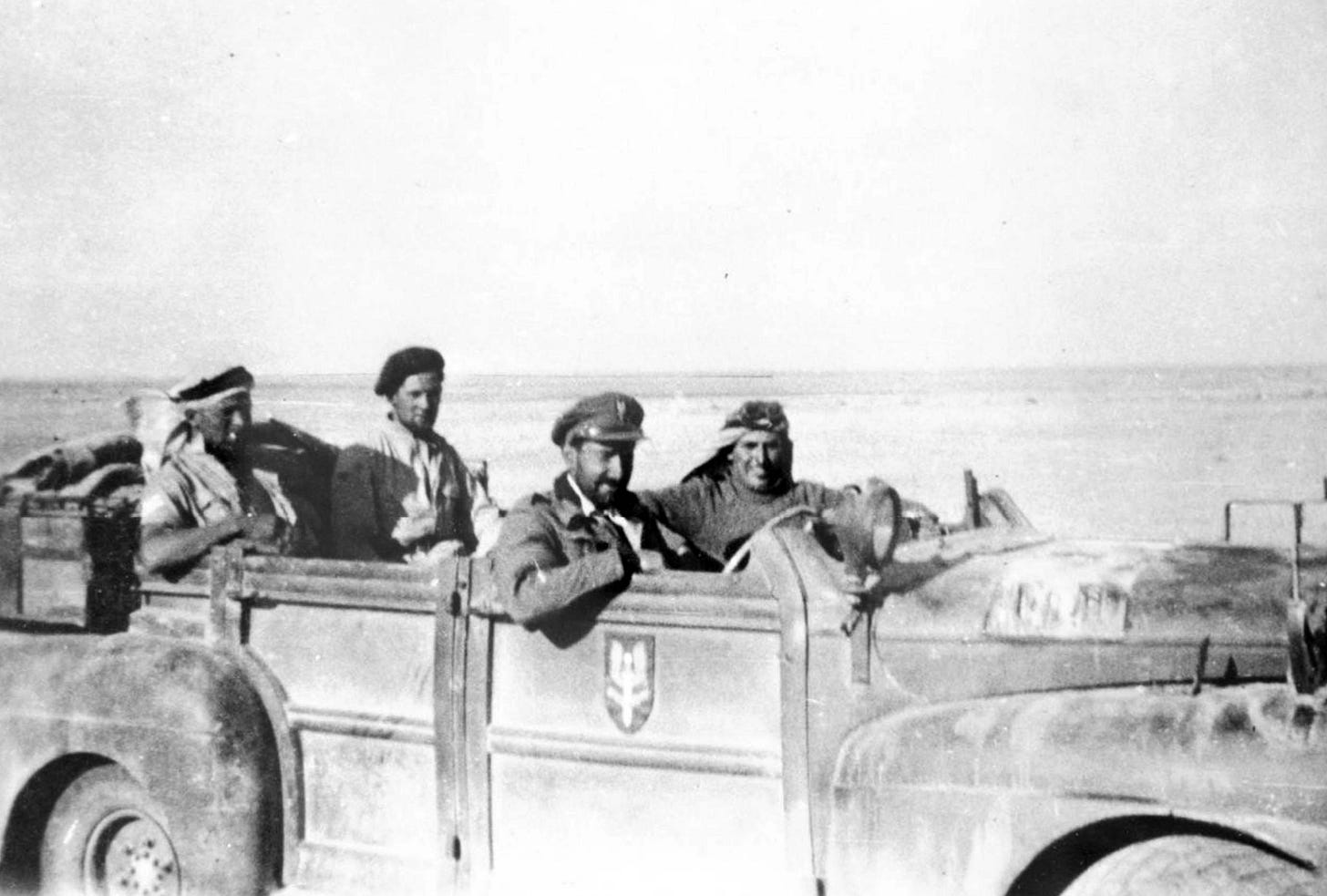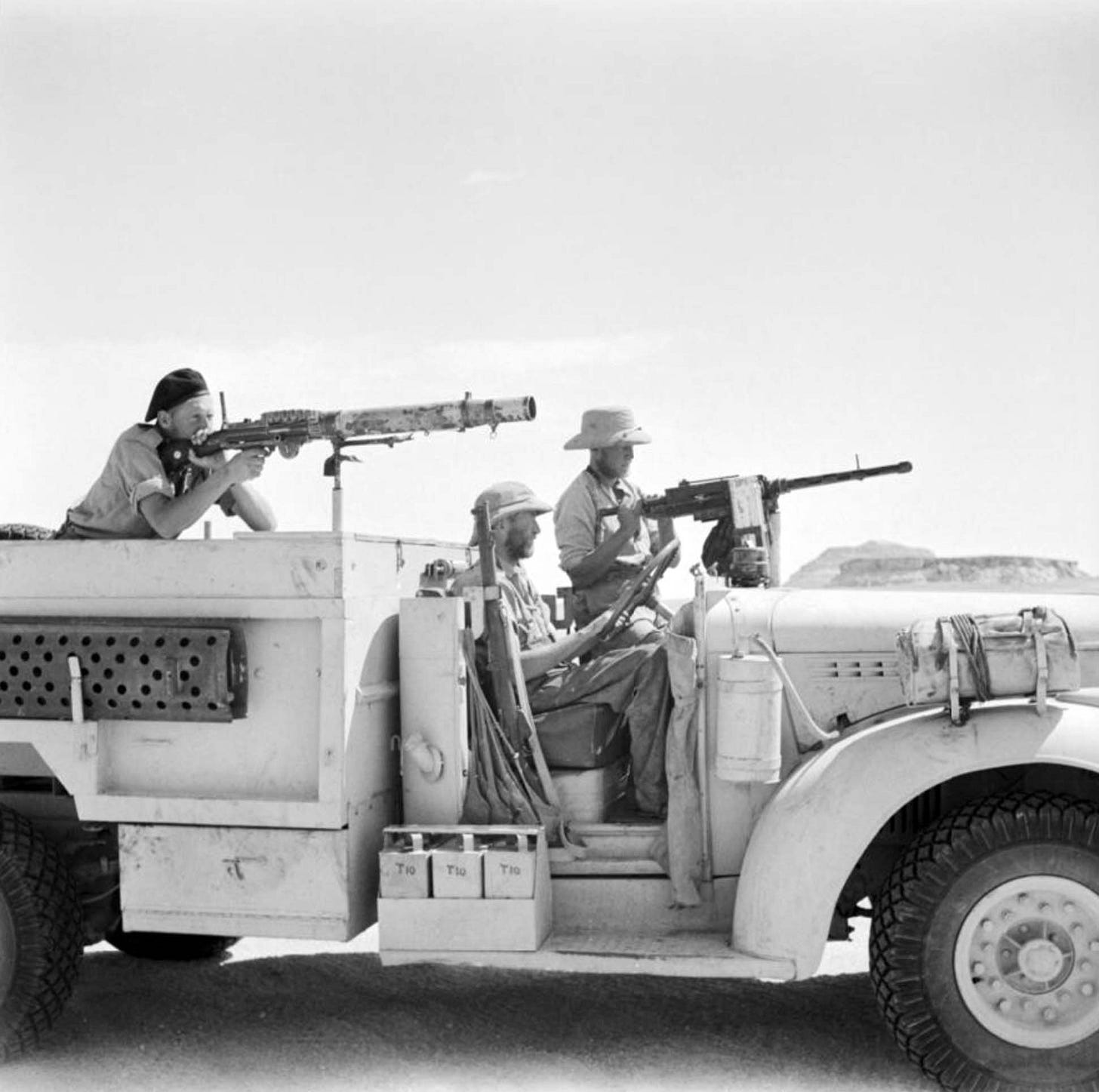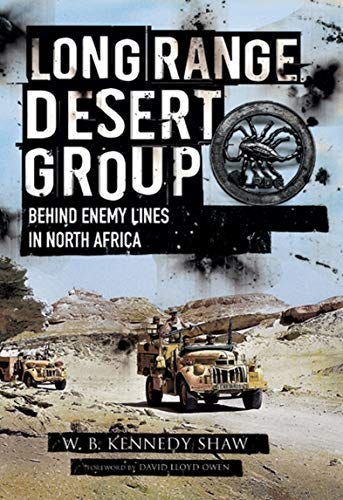The Long Range Desert Group was the famous British reconnaissance and raiding group that operated far and wide across North Africa. The exploits of the group came to public notice in 1945 with the publication of this unit history by the LRDG Intelligence Officer, W.B. Kennedy Shaw - now reissued by Frontline books. This is the classic account of the unit’s work from the early days through to 1943 from one the few men who had a complete overview of their activities.
Described by Major General David Lloyd Owen (formerly a Lieutenant with the LRDG in its earliest days and later its Commanding Officer) as a ‘factual and exciting chronicle’ with an ‘evocative and stirring narrative’ this is essential reading for those wanting to understand the both LRDG and the early days of the SAS.
The following excerpt covers a raid into Benghazi on the 21st May 1942 led by David Stirling, who could claim to be the founder of the SAS:

There were six in Stirling’s party : himself, [Fitzroy] Maclean, Randolph Churchill [son of Winston Churchill] , and three others including Seekings and Cooper who had a part in all Stirling’s wildest exploits.
Just before midnight they left the rendezvous and drove northwards to the road which leads down to Regima from El Abiar, and here the trouble began. Stirling’s car was a Ford, a staff car of the type which he always used in the pre-Jeep days, with the body cut down to the level of the doors and looking in the distance or the dark rather like a German Volkswagen.
Coming across country from Siwa the track rods had been bent on some bump and as a result the front wheels were not truly parallel. In the desert this did not matter much but once on the smooth tarmac the tyres, askew, produced a high-pitched scream. There was no time to do anything about it so, screaming, they drove on towards Benghazi.
Near Benina was the road-block, a fairly old friend by this time. Stirling slowed at the bar as the sentry came forward into the glare of the headlights and inside the car, below the level of the body, the safety catches on five Tommy-guns slid back. Not to be used here,ofcourse,butjust in case...if the sentry did something tiresome.
However, the sentry was a good Italian, and when Maclean, the linguist of the party, answered “ Staff officers ” to his challenge he raised the bar and let them through.
With the tyres still squeaking Stirling drove on. By making a circle round Benghazi and coming in along the Tocra road from the north he could avoid much of the’town and Arrive more easily at the harbour for he was after ships this time, not aircraft, his usual game.
On the causeway outside the Derna Gate a car met them and passed by, then stopped, turned hurriedly and came back. This looked bad ; the sentry at Benina must have suspected something after all and done some rapid telephoning. So squeaking louder than ever and with the car behind seemingly in pursuit Stirling drove headlong into the town. Gaining a little on the pursuers, he turned quickly into a side alley and stopped; the car behind dashed’ past and on down the main road.
In the alleyway the car’s crew waited anxiously but all was quiet; it seemed as if they had dodged their pursuers successfully. Then all over the city the air raid sirens started to wail. There was no sound of aircraft and no bombs falling ; moreover it had been arranged with Middle East that Benghazi should not be raided that night, and they assumed that this must indicate some special form of alarm against British ground forces. If this were so all the roads would be held and the best thing to do seemed to be to put a time bomb in the car and try to get away on foot. They could hardly hope, if the hunt was up, in the same squeaking car to drive out of the town and through the road-blocks. So they started to walk out, creeping along the dark and narrow streets.
Before long an Italian policeman appeared who gave Maclean his opinion that the air raid was a false alarm and said that he, at any rate, was going home to bed. By now the sirens had stopped and all was quiet : it seemed that they might make an attempt on the harbour after all.
In a few moments they were back at the abandoned Ford again, wondering if the half-hour time-pencil would last out another five minutes, for these fuses tend to be temperamental and disregard the smaller divisions of time. Someone groped in the back of the car, pulled out the pencil and detonator and threw them round the corner. The town was still quiet so they started to get on with the job.
Stirling had brought with him from Cairo two collapsible rubber boats and a supply of heavy explosive charges for use against enemy shipping in the harbour. He hoped to get down to the water’s edge, inflate the boats and paddle out to the ships. A steamer or two sunk alongside the moles, or better still in the fairway, would cause the enemy a lot of trouble.
Stirling, Maclean and Cooper started off for the waterside carrying a boat and the charges. A barbed wire fence surrounded the harbour but they found a convenient hole and scrambled through. Inside a sentry challenged. “ Militari,” Maclean answered, and asked him the way to the hotel, for the “ luggage ” they were carrying needed some explanation. The sentry knew of no hotel; the British bombing had wrecked those which existed formerly so Maclean thanked him and passed on.
Down at the water’s edge they began to pump up the boat but that night they seemed to be dogged by squeaks and the pump screeched with each stroke. From a ship moored not far out a sentry challenged. “ Militari,” shouted Maclean, and continued pumping. Again the guard on the ship challenged. By this time Maclean was beginning to get rather tired of Italian sentries. “ Will you stop challenging me ? ” he called. “ I’ve already told you twice who I am,” and went on with the pump.
But the rubber boat refused to be inflated. On the long journey across the desert from Siwa it had been rubbed against the car and punctured so Maclean went back to the car for the other boat. With this he started back to the harbour but to save time and a scramble through the wire entered at the main gate. Here were five or six sentries who gave no trouble, but down by the waterside there appeared another who was more inquisitive and would not leave them in peace.
By now Maclean’s patience with Italian sentries was exhausted. He returned to the main gate and demanded to see the N.C.O. in charge of the guard. From a dimly-lit shack came a sleepy Italian corporal, pulling on his trousers. Maclean turned on him sharply.
“ This,” he said, “ is simply disgraceful. Half a dozen times you have let us through this gate, carrying all this stuff. It might be bombs. How do you know we are not British ? You should have asked for our identity papers.” The corporal was anxious and apologetic. He would certainly reprimand the sentries who were no doubt reluctant to bother such important officers as’ Maclean and his party.
“ Well,” answered Maclean, "don t let this sort of thing occur again. We are now going to collect our kit from inside the wire and leave.” And did so.
Back at the car where the driver was hammering at the bent track rods it was beginning to get light and it was evident that there was no time to get clear of the town before dawn. So a hiding place for the day had to be found. First they found a garage which looked suitable but the door was too narrow to get the car inside. Nearby was a second garage large enough, and by good luck it had above it a flat which seemed to be deserted.
Creeping up the stairs they found it empty and here spent the day, lying for the most of the time on the floor to keep below the level of the blown-in windows. On the opposite side of the road there was much coming and going at a German headquarter office of some sort, and at the back the flat shared a courtyard with an Arab family who could be heard talking on the other side of the partition wall.

This excerpt from Long Range Desert Group appears by kind permission of Pen & Sword Books Ltd. Copyright remains with the author.
NB The above images are not from this volume, although it does have a selection of facsimile images which do not reproduce well here.
Another LRDG Operation featured earlier this month.



